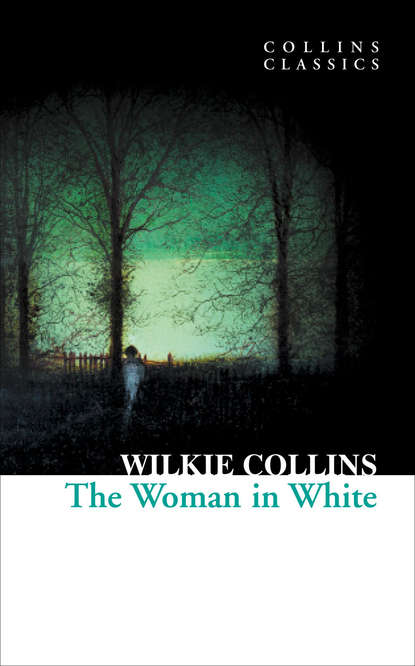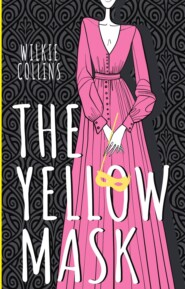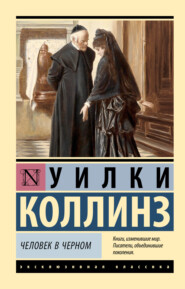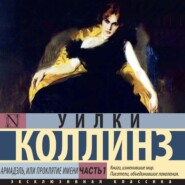По всем вопросам обращайтесь на: info@litportal.ru
(©) 2003-2024.
✖
The Woman in White
Автор
Год написания книги
2019
Настройки чтения
Размер шрифта
Высота строк
Поля
“As your friend,” she proceeded, “I am going to tell you, at once, in my own plain, blunt, downright language, that I have discovered your secret—without help or hint, mind, from any one else. Mr. Hartright, you have thoughtlessly allowed yourself to form an attachment—a serious and devoted attachment I am afraid—to my sister Laura. I don’t put you to the pain of confessing it in so many words, because I see and know that you are too honest to deny it. I don’t even blame you—I pity you for opening your heart to a hopeless affection. You have not attempted to take any underhand advantage—you have not spoken to my sister in secret. You are guilty of weakness and want of attention to your own best interests, but of nothing worse. If you had acted, in any single respect, less delicately and less modestly, I should have told you to leave the house without an instant’s notice, or an instant’s consultation of anybody. As it is, I blame the misfortune of your years and your position—I don’t blame you. Shake hands—I have given you pain; I am going to give you more, but there is no help for it—shake hands with your friend, Marian Halcombe, first.”
The sudden kindness—the warm, high-minded, fearless sympathy which met me on such mercifully equal terms, which appealed with such delicate and generous abruptness straight to my heart, my honour, and my courage, overcame me in an instant. I tried to look at her when she took my hand, but my eves were dim. I tried to thank her, but my voice failed me.
“Listen to me,” she said, considerately avoiding all notice of my loss of self-control. “Listen to me, and let us get it over at once. It is a real true relief to me that I am not obliged, in what I have now to say, to enter into the question—the hard and cruel question as I think it—of social inequalities. Circumstances which will try you to the quick, spare me the ungracious necessity of paining a man who has lived in friendly intimacy under the same roof with myself by any humiliating reference to matters of rank and station. You must leave Limmeridge House, Mr. Hartright, before more harm is done. It is my duty to say that to you; and it would be equally my duty to say it, under precisely the same serious necessity, if you were the representative of the oldest and wealthiest family in England. You must leave us, not because you are a teacher of drawing—”
She waited a moment, turned her face full on me, and reaching across the table, laid her hand firmly on my arm.
“Not because you are a teacher of drawing,” she repeated, “but because Laura Fairlie is engaged to be married.”
The last word went like a bullet to my heart. My arm lost all sensation of the hand that grasped it. I never moved and never spoke. The sharp autumn breeze that scattered the dead leaves at our feet came as cold to me, on a sudden, as if my own mad hopes were dead leaves too, whirled away by the wind like the rest. Hopes! Betrothed, or not betrothed, she was equally far from me. Would other men have remembered that in my place? Not if they had loved her as I did.
The pang passed, and nothing but the dull numbing pain of it remained. I felt Miss Halcombe’s hand again, tightening its hold on my arm—I raised my head and looked at her. Her large black eyes were rooted on me, watching the white change on my face, which I felt, and which she saw.
“Crush it!” she said. “Here, where you first saw her, crush it! Don’t shrink under it like a woman. Tear it out; trample it under foot like a man!”
The suppressed vehemence with which she spoke, the strength which her will—concentrated in the look she fixed on me, and in the hold on my arm that she had not yet relinquished—communicated to mine, steadied me. We both waited for a minute in silence. At the end of that time I had justified her generous faith in my manhood—I had, outwardly at least, recovered my self-control.
“Are you yourself again?”
“Enough myself, Miss Halcombe, to ask your pardon and hers. Enough myself to be guided by your advice, and to prove my gratitude in that way, if I can prove it in no other.”
“You have proved it already,” she answered, “by those words. Mr. Hartright, concealment is at an end between us. I cannot affect to hide from you what my sister has unconsciously shown to me. You must leave us for her sake, as well as for your own. Your presence here, your necessary intimacy with us, harmless as it has been, God knows, in all other respects, has unsteadied her and made her wretched. I, who love her better than my own life—I, who have learnt to believe in that pure, noble, innocent nature as I believe in my religion—know but too well the secret misery of self-reproach that she has been suffering since the first shadow of a feeling disloyal to her marriage engagement entered her heart in spite of her. I don’t say—it would be useless to attempt to say it after what has happened—that her engagement has ever had a strong hold on her affections. It is an engagement of honour, not of love; her father sanctioned it on his deathbed, two years since; she herself neither welcomed it nor shrank from it—she was content to make it. Till you came here she was in the position of hundreds of other women, who marry men without being greatly attracted to them or greatly repelled by them, and who learn to love them (when they don’t learn to hate!) after marriage, instead of before. I hope more earnestly than words can say—and you should have the self-sacrificing courage to hope too—that the new thoughts and feelings which have disturbed the old calmness and the old content have not taken root too deeply to be ever removed. Your absence (if I had less belief in your honour, and your courage, and your sense, I should not trust to them as I am trusting now) your absence will help my efforts, and time will help us all three. It is something to know that my first confidence in you was not all misplaced. It is something to know that you will not be less honest, less manly, less considerate towards the pupil whose relation to yourself you have had the misfortune to forget, than towards the stranger and the outcast whose appeal to you was not made in vain.”
Again the chance reference to the woman in white! Was there no possibility of speaking of Miss Fairlie and of me without raising the memory of Anne Catherick, and setting her between us like a fatality that it was hopeless to avoid?
“Tell me what apology I can make to Mr. Fairlie for breaking my engagement,” I said. “Tell me when to go after that apology is accepted. I promise implicit obedience to you and to your advice.”
“Time is every way of importance,” she answered. “You heard me refer this morning to Monday next, and to the necessity of setting the purple room in order. The visitor whom we expect on Monday—”
I could not wait for her to be more explicit. Knowing what I knew now, the memory of Miss Fairlie’s look and manner at the breakfast-table told me that the expected visitor at Limmeridge House was her future husband. I tried to force it back; but something rose within me at that moment stronger than my own will, and I interrupted Miss Halcombe.
“Let me go to-day,” I said bitterly. “The sooner the better.”
“No, not to-day,” she replied. “The only reason you can assign to Mr. Fairlie for your departure, before the end of your engagement, must be that an unforeseen necessity compels you to ask his permission to return at once to London. You must wait till to-morrow to tell him that, at the time when the post comes in, because he will then understand the sudden change in your plans, by associating it with the arrival of a letter from London. It is miserable and sickening to descend to deceit, even of the most harmless kind—but I know Mr. Fairlie, and if you once excite his suspicions that you are trifling with him, he will refuse to release you. Speak to him on Friday morning: occupy yourself afterwards (for the sake of your own interests with your employer) in leaving your unfinished work in as little confusion as possible, and quit this place on Saturday. It will be time enough then, Mr. Hartright, for you, and for all of us.”
Before I could assure her that she might depend on my acting in the strictest accordance with her wishes, we were both startled by advancing footsteps in the shrubbery. Some one was coming from the house to seek for us! I felt the blood rush into my cheeks and then leave them again. Could the third person who was fast approaching us, at such a time and under such circumstances, be Miss Fairlie?
It was a relief—so sadly, so hopelessly was my position towards her changed already—it was absolutely a relief to me, when the person who had disturbed us appeared at the entrance of the summer-house, and proved to be only Miss Fairlie’s maid.
“Could I speak to you for a moment, miss?” said the girl, in rather a flurried, unsettled manner.
Miss Halcombe descended the steps into the shrubbery, and walked aside a few paces with the maid.
Left by myself, my mind reverted, with a sense of forlorn wretchedness which it is not in any words that I can find to describe, to my approaching return to the solitude and the despair of my lonely London home. Thoughts of my kind old mother, and of my sister, who had rejoiced with her so innocently over my prospects in Cumberland—thoughts whose long banishment from my heart it was now my shame and my reproach to realise for the first time—came back to me with the loving mournfulness of old, neglected friends. My mother and my sister, what would they feel when I returned to them from my broken engagement, with the confession of my miserable secret—they who had parted from me so hopefully on that last happy night in the Hampstead cottage!
Anne Catherick again! Even the memory of the farewell evening with my mother and my sister could not return to me now unconnected with that other memory of the moonlight walk back to London. What did it mean? Were that woman and I to meet once more? It was possible, at the least. Did she know that I lived in London? Yes; I had told her so, either before or after that strange question of hers, when she had asked me so distrustfully if I knew many men of the rank of Baronet. Either before or after—my mind was not calm enough, then, to remember which.
A few minutes elapsed before Miss Halcombe dismissed the maid and came back to me. She, too, looked flurried and unsettled now.
“We have arranged all that is necessary, Mr. Hartright,” she said. “We have understood each other, as friends should, and we may go back at once to the house. To tell you the truth, I am uneasy about Laura. She has sent to say she wants to see me directly, and the maid reports that her mistress is apparently very much agitated by a letter that she has received this morning—the same letter, no doubt, which I sent on to the house before we came here.”
We retraced our steps together hastily along the shrubbery path. Although Miss Halcombe had ended all that she thought it necessary to say on her side, I had not ended all that I wanted to say on mine. From the moment when I had discovered that the expected visitor at Limmeridge was Miss Fairlie’s future husband, I had felt a bitter curiosity, a burning envious eagerness, to know who he was. It was possible that a future opportunity of putting the question might not easily offer, so I risked asking it on our way back to the house.
“Now that you are kind enough to tell me we have understood each other, Miss Halcombe,” I said, “now that you are sure of my gratitude for your forbearance and my obedience to your wishes, may I venture to ask who”—(I hesitated—I had forced myself to think of him, but it was harder still to speak of him, as her promised husband)—“who the gentleman engaged to Miss Fairlie is?”
Her mind was evidently occupied with the message she had received from her sister. She answered in a hasty, absent way—
“A gentleman of large property in Hampshire.”
Hampshire! Anne Catherick’s native place. Again, and yet again, the woman in white. There was a fatality in it.
“And his name?” I said, as quietly and indifferently as I could.
“Sir Percival Glyde.”
Sir—Sir Percival! Anne Catherick’s question—that suspicious question about the men of the rank of Baronet whom I might happen to know—had hardly been dismissed from my mind by Miss Halcombe’s return to me in the summer-house, before it was recalled again by her own answer. I stopped suddenly, and looked at her.
“Sir Percival Glyde,” she repeated, imagining that I had not heard her former reply.
“Knight, or Baronet?” I asked, with an agitation that I could hide no longer.
She paused for a moment, and then answered, rather coldly—
“Baronet, of course.”
XI
Not a word more was said, on either side, as we walked back to the house. Miss Halcombe hastened immediately to her sister’s room, and I withdrew to my studio to set in order all of Mr. Fairlie’s drawings that I had not yet mounted and restored before I resigned them to the care of other hands. Thoughts that I had hitherto restrained, thoughts that made my position harder than ever to endure, crowded on me now that I was alone.
She was engaged to be married, and her future husband was Sir Percival Glyde. A man of the rank of Baronet, and the owner of property in Hampshire.
There were hundreds of baronets in England, and dozens of landowners in Hampshire. Judging by the ordinary rules of evidence, I had not the shadow of a reason, thus far, for connecting Sir Percival Glyde with the suspicious words of inquiry that had been spoken to me by the woman in white. And yet, I did connect him with them. Was it because he had now become associated in my mind with Miss Fairlie, Miss Fairlie being, in her turn, associated with Anne Catherick, since the night when I had discovered the ominous likeness between them? Had the events of the morning so unnerved me already that I was at the mercy of any delusion which common chances and common coincidences might suggest to my imagination? Impossible to say. I could only feel that what had passed between Miss Halcombe and myself, on our way from the summer-house, had affected me very strangely. The foreboding of some undiscoverable danger lying hid from us all in the darkness of the future was strong on me. The doubt whether I was not linked already to a chain of events which even my approaching departure from Cumberland would be powerless to snap asunder—the doubt whether we any of us saw the end as the end would really be—gathered more and more darkly over my mind. Poignant as it was, the sense of suffering caused by the miserable end of my brief, presumptuous love seemed to be blunted and deadened by the still stronger sense of something obscurely impending, something invisibly threatening, that Time was holding over our heads.
I had been engaged with the drawings little more than half an hour, when there was a knock at the door. It opened, on my answering; and, to my surprise, Miss Halcombe entered the room.
Her manner was angry and agitated. She caught up a chair for herself before I could give her one, and sat down in it, close at my side.
“Mr. Hartright,” she said, “I had hoped that all painful subjects of conversation were exhausted between us, for to-day at least. But it is not to be so. There is some underhand villainy at work to frighten my sister about her approaching marriage. You saw me send the gardener on to the house, with a letter addressed, in a strange handwriting, to Miss Fairlie?”
“Certainly.”
“The letter is an anonymous letter—a vile attempt to injure Sir Percival Glyde in my sister’s estimation. It has so agitated and alarmed her that I have had the greatest possible difficulty in composing her spirits sufficiently to allow me to leave her room and come here. I know this is a family matter on which I ought not to consult you, and in which you can feel no concern or interest—”
“I beg your pardon, Miss Halcombe. I feel the strongest possible concern and interest in anything that affects Miss Fairlie’s happiness or yours.”
“I am glad to hear you say so. You are the only person in the house, or out of it, who can advise me. Mr. Fairlie, in his state of health and with his horror of difficulties and mysteries of all kinds, is not to be thought of. The clergyman is a good, weak man, who knows nothing out of the routine of his duties; and our neighbours are just the sort of comfortable, jog-trot acquaintances whom one cannot disturb in times of trouble and danger. What I want to know is this: ought I at once to take such steps as I can to discover the writer of the letter? or ought I to wait, and apply to Mr. Fairlie’s legal adviser to-morrow? It is a question—perhaps a very important one—of gaining or losing a day. Tell me what you think, Mr. Hartright. If necessity had not already obliged me to take you into my confidence under very delicate circumstances, even my helpless situation would, perhaps, be no excuse for me. But as things are I cannot surely be wrong, after all that has passed between us, in forgetting that you are a friend of only three months’ standing.”
She gave me the letter. It began abruptly, without any preliminary form of address, as follows—

















